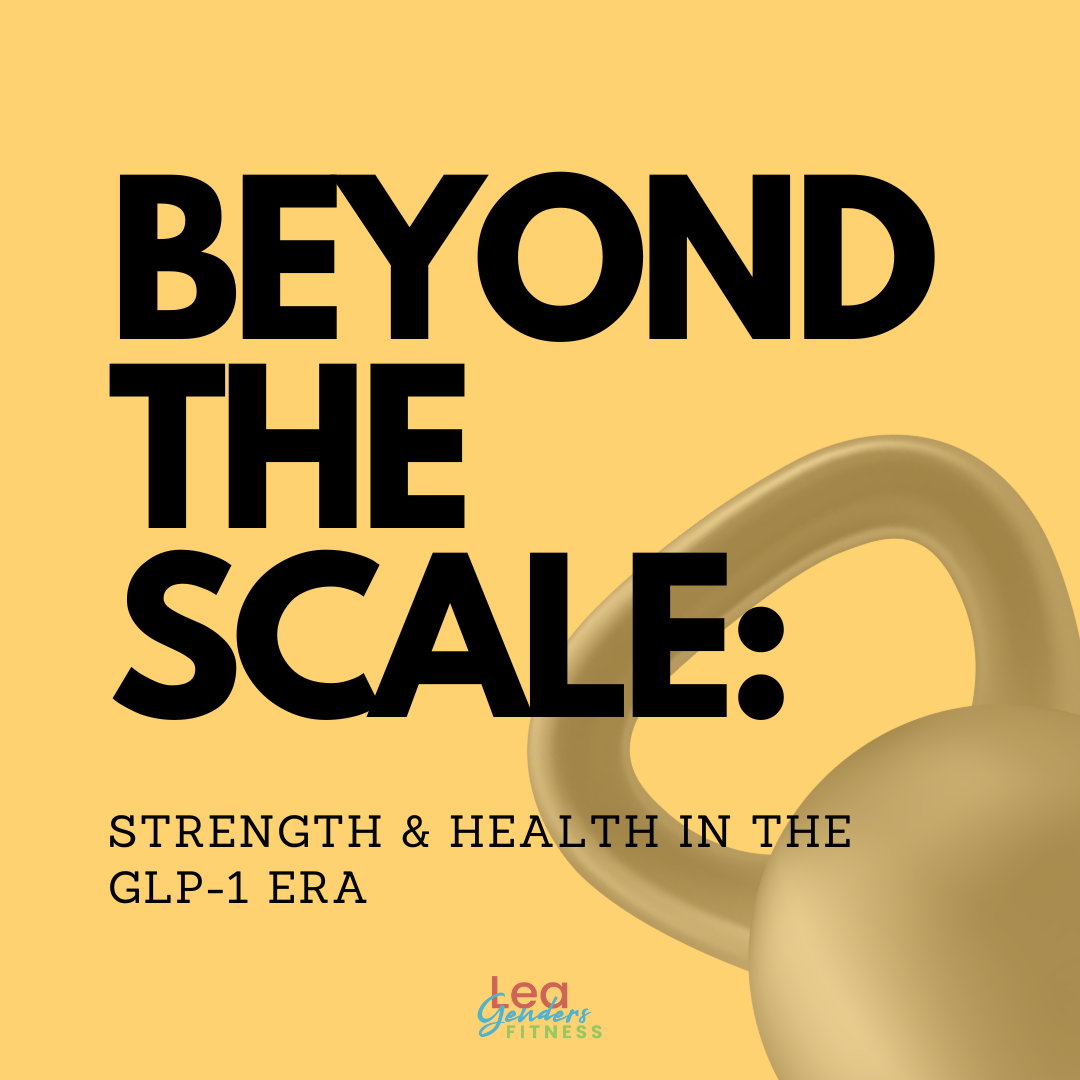There’s a lot of conversation these days about weight loss drugs like Ozempic, Mounjaro and Zepbound. These medications can deliver fast results. But with or without them, lasting success comes from something bigger: building muscle, moving regularly, and maintaining a strong foundation of healthy nutrition habits, like protein and fiber intake.
This article isn't about encouraging or discouraging medication. It's about taking an honest look at the full picture of fat loss and metabolic health, whether you choose to use a GLP-1 medication or not.
As a board-certified health coach and certified personal trainer, it’s outside my professional scope to recommend medications. That decision is always between you and your medical team.
But because so many people are curious about the role medications might play in a sustainable plan, I spoke with Elizabeth Story, MD, a board-certified family practice physician who provides direct-access concierge medical care in Fort Worth and Southlake. She has extensive experience helping patients navigate weight loss and metabolic health, and I know firsthand she walks the walk. She did personal training with me to build strength, gain muscle, and support her long-term health.
In this article, Dr. Story shares her medical perspective while I provide you with the coaching lens to provide you helpful, practical information as you and your health team make an informed decision. As always, it’s my goal to help you in building a strong, resilient body for life.
Beyond the Scale: Strength and Health in the GLP-1 Era
Q: A lot of people refer to GLP-1s as weight loss drugs. From a medical perspective, is that an oversimplification?
Dr. Story:
"GLP medications such as Ozempic and Mounjaro, also known by their peptide names of semaglutide and tirzepatide, are revolutionary medications not only for diabetic patients but for anyone needing to optimize their metabolism or lose extra fat. Referring to them as just weight loss drugs doesn't take into account their anti-inflammatory effect and overall positive metabolic parameter improvements seen with their use."
Lea:
That's an important distinction. The media often oversimplifies these drugs, focusing only on the weight loss side and ignoring the broader health impact. I work with many midlife women, who are not just focused on how they look, but how they feel and how they age. That matters if a medication can support better metabolic health, reduce inflammation, and improve quality of life. These improvements are meaningful, and when combined with strong lifestyle habits, they create an even more powerful foundation for long-term health.
Q: What other health benefits have you seen improve with these medications?
Dr. Story:
”Many patients on these medications can see a diagnosis of hypertension or high blood pressure get resolved by losing weight, thereby negating their need for hypertensive medications. Often, cholesterol and triglycerides improve with weight loss on these medications, especially if someone watches their diet closely and maintains good physical activity, such as strength training and a degree of cardiovascular exercise."
Lea:
Yes, this is where it really comes together. Medication may help someone lose weight, but strength training and nutrition habits keep you healthy. If someone loses significant weight without resistance training and enough protein, they're not just losing fat, they’re also losing a lot of muscle along the way, a real issue for long-term health and longevity.
Muscle isn't just about how you look, it's about how you live. It supports your bones, stabilizes your joints, strengthens your metabolism, and helps you move confidently and independently. Losing muscle means living with less strength, a slower metabolism, more fatigue, and a higher risk of falls and injuries.
My coaching programs focus on building strength for sustainable fat loss, not just chasing weight loss. That means progressive strength training, tracking protein to fuel the body, and building sustainable habits. Muscle is protective. Muscle is longevity. Muscle is non-negotiable.
Q: These medications reduce appetite and food cravings. What changes do your patients typically experience?
Dr. Story:
"People often tell me that their 'food noise' is no longer there telling them to snack or eat even if they are not hungry. I have numerous patients who describe a sense of 'freedom' as their thoughts and behaviors are not centered around food. One of the benefits of the GLP medications is its effect on curbing cravings not only for food, but also alcohol."
Lea:
I've also heard about that freedom from my clients on these medications. When food chatter quiets down, it can feel incredibly liberating. But it can also mean that eating becomes less of a priority in the mind—which makes being intentional about getting the nutrients your body needs even more important.
This is especially true if you’re training for fitness or athletic performance. You need enough nutrients not just to fuel your workouts, but to recover from them. That recovery is essential for both performance and injury prevention. And when your appetite drops, every bite has to work harder for you, making nutrient-dense choices even more important. During fat loss, protein needs increase to help minimize muscle loss and maintain strength.
Q: What else do you want people to understand about metabolic health and long-term success?
Dr. Story:
"Weight optimization and metabolic health come from long-term sustained habit changes and the daily commitment to healthy choices. Ensuring adequate fiber and protein intake are critical for maintaining muscle and bone health. Limiting processed foods, especially those with refined sugars, is also another important factor in achieving metabolic health.”
Lea:
Yes, I couldn't agree more. Long-term success comes down to consistent, sustainable habits.
In coaching, I encourage clients to anchor their meals with high-quality protein and fiber, especially during fat loss phases.
Protein helps maintain muscle, supports bone density, and strengthens metabolism. I encourage clients to include a solid protein source at every meal, such as lean meats, fish, eggs, Greek yogurt, tofu, or (as an option) high-quality protein powder, to keep their bodies strong and supported.
Fiber supports digestion, gut health, blood sugar regulation, and steady energy.
When you're eating less overall, these nutrients give you the most benefit for your effort.
In coaching, we look at the whole picture: strength, nutrition, sleep, stress, and movement that fits your life.
Q: How can these medications help people improve mobility, reduce joint pain, and address health conditions that make movement more difficult?
Dr. Story:
"Tirzepatide (Mounjaro and Zepbound) has been FDA-approved to treat obstructive sleep apnea, which is often weight-related and can lead to long-term cardiovascular diseases such as the risk of heart attack and stroke. There are ongoing studies, both of which document Ozempic and Mounjaro's effectiveness in decreasing osteoarthritis of the knees. This effect, along with weight loss, can be the bridge some people need to be active again."
Lea:
I love that. Sometimes people need a bridge. It's encouraging. I've seen it with my own clients. When someone starts to feel better, they want to move more. Less joint pain, more energy, better sleep. It creates the momentum to take the next step.
That doesn't mean high-impact workouts or hour-long training sessions. We can start small with resistance bands, bodyweight movements, and short strength sessions focused on form and consistency. The goal is to build strength gradually to support the body for the long haul.
Q: As with any medication, there are pros and cons that should be discussed with your doctor before making a decision. We covered a lot of the benefits. What are some potential side effects or downsides people should consider?
Dr. Story:
"Contraindications are a history of pancreatitis, multiple endocrine neoplasia or Medullary thyroid cancer. Relative contraindication is known gallstones. The main side effect is nausea, usually the day after the injection. It does get less noticeable with time, but a few people are unable to tolerate due to the nausea. The newer medication, Zepbound, has less of the GI side effects. The second most common side effect is constipation but this is usually remedied with increased water consumption and addition of evening Magnesium supplements, which are good for other aspects of health as well."
Lea:
Side effects are a real part of the conversation, and I’ve seen them vary widely from person to person. When I work with clients, we talk about managing expectations. Every tool, whether it’s medication, a workout program, or a nutrition change, comes with trade-offs. Success often comes down to staying flexible, communicating with your doctor or coach, adjusting when needed, and giving yourself permission to course-correct if something doesn’t work the way you hoped. Health is never about one perfect solution, it’s about building a system you can live with long term.
Q: What kinds of people are the best candidates for these medications, and on the flip side, who might not be a good candidate?
Dr. Story:
"The best candidates are those people who have a BMI of over 30, or over 27 with comorbid conditions like high cholesterol, prediabetes, metabolic syndrome, high blood pressure, sleep apnea, or back or knee osteoarthritis. Most Americans would qualify simply due to BMI and comorbid conditions. If someone is objectively thin but thinks otherwise, they are often not a good candidate. Ideally, patients who take this for the purpose of weight loss should have an elevated BMI or waist circumference compatible with obesity."
Lea:
One thing we talk about a lot in coaching is mindset and identity. It’s not only about BMI or lab numbers. It’s about building the belief that you are the kind of person who takes care of your body out of self-care, not self-criticism. That simple but powerful shift can change how you approach your goals, your choices, and your long-term success.
Weight loss can be a meaningful goal, but so can building strength, improving energy, and feeling confident in your body. No matter what path someone chooses, it's important to align actions with a vision of long-term health, not just short-term change.
Q: You've also experienced this journey yourself. Can you share a bit about your personal experience?
Dr. Story:
"I can speak from my own personal experience of being on a GLP medication for six years that not only was I able to achieve and maintain a 60-pound weight reduction, I have also been able to normalize my cholesterol and blood sugar without the use of other medications. I find that when I combine good protein intake, replenishing sleep, regular weight training and maintenance dosing of a GLP I am able to sustain the weight loss and health benefits, plus I feel better than I ever have."
Lea:
I love that you're a role model for your patients. You’re not just prescribing habits—you’re living them. Your story shows what’s possible when medication is combined with strength training, quality sleep, and intentional nutrition.
That’s the kind of lifestyle that leads to real, lasting change. My goal with clients is to help build a realistic, sustainable system that supports their strength, health, and goals for the long term.
When people combine smart medical support with strong lifestyle habits, the results go way beyond the scale. They show up in strength, energy, confidence, labs, and resilience.
Q: How can people reach out to you if they are interested in learning more about your services?
Dr. Story:
People can call my office at 817-346-4000 or go to my website at www.elizabethstorymd.com. I am happy to answer any questions!
Dr. Story wraps it up beautifully:
"Having a personal trainer is essential as this person serves as an 'accountability coach' to make sure someone really sticks to the plan. I serve a similar role for a person's metabolic journey as I encourage patients when they have made progress and stand by their side when they need support and direction."
Lea:
Having the right support can empower you to make lasting changes. Your doctor can help manage the medical side. As a coach and trainer, I help guide the behavior change and strength work that support your long-term health. These roles complement each other. When medical care, lifestyle support, and consistent movement come together, it creates a more complete approach to feeling better, getting stronger, and aging well.
Medications may be one tool to consider, but no matter what path you choose, strength, movement, and daily habits are what create lasting health. If you're ready to lay that foundation and feel stronger in your body, I'd love to support you.
Questions? I’d love to help.
Lea
I am a board certified health coach, personal trainer, and running coach, dedicated to helping you get strong, body and mind!












Forget the pressure to "end the year strong." This December, I am exploring a different approach: ending the year soft. Learn how compassion, rest, and grace can set you up for a healthier New Year than pushing ever could.